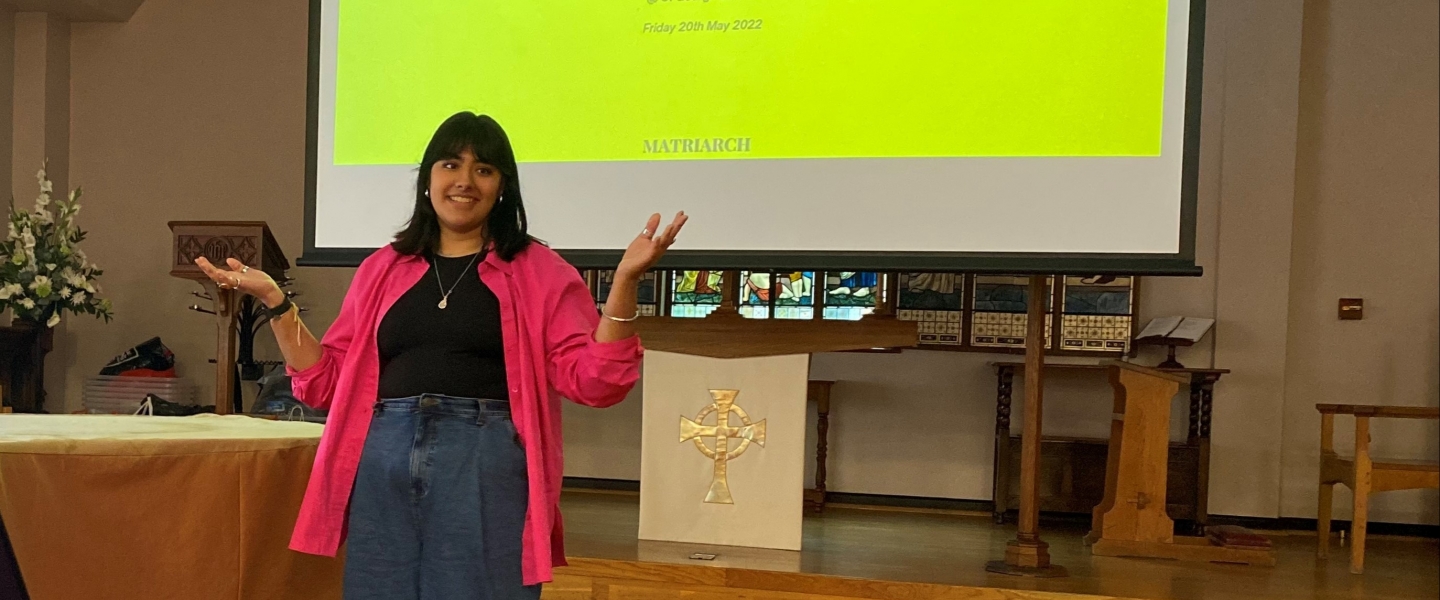We were delighted to be joined by equality, diversity and inclusivity (ED&I) expert, Ria Kalsi, during St George’s second annual Cultural Diversity Week recently. Ria, Founder of Matriarch, an organisation specifically established to design and facilitate inclusion workshops for schools, made such an impression on our Sixth Form pupils earlier this year that we were keen to invite her back to enrich the understanding of girls throughout every year group during our Cultural Diversity Week and in the lead up to UNESCO’s World Day for Cultural Diversity for Dialogue and Development 2022 which took place on Saturday, 21 May.
The energy and enthusiasm of the girls for developing knowledge and understanding of what can sometimes feel like a thorny and sensitive topic to broach, was palpable. Ria immediately put them at ease by reassuring them that participation and asking questions was a positive step towards developing insight. Her only caveats were to encourage empathy, compassion and understanding.
She set the scene by highlighting some of the key themes she would be covering - racism; privilege; slavery; colonialism - and when framing the concept of privilege, she referred to Newton’s Third Law of Motion:
For every action, there is an equal and opposite reaction.
Isaac Newton's 'Third Law of Motion'
Using the possession of a passport as a simple demonstration of privilege (versus non ownership as an example of lack of privilege), she enabled the girls to broaden their thinking about a wide range of life dimensions that could be considered either a privilege or lack of privilege. Ria set out the Type 1 privileges - features of your character you are born with e.g ethnicity, gender, sexuality, and the Type 2 privileges - features of your life over which you have some ownership e.g socio-economic status, relationships, health. She effectively articulated the architecture of the world, going back through civilisation, to highlight the emergence of white people as a dominant race. She shared examples of slavery and colonialism which helped explain how hierarchies had become established, and how tensions between ethnic groups and gender types had come to be.
Ria openly shared with the girls some of her own experiences of racism when growing up and those of her family as immigrants from India in the 1960s, carefully outlining how racism, as one example of a lack of acceptance of diversity, can quite subtly be endemic. She turned to exploring unconscious bias, as well as unpacking what privilege in the context of ED&I actually means. She was clear that one should not be apologetic for being in a position of privilege, but encouraged the girls to consider how they could ensure this was not used as a way to domineer others who may not be afforded the same privileges.
Ria used several smart breakout sessions and asked the girls to pair up and really consider some of their own preconceptions and/or prejudices. For example, based on two images - one of a young, healthy, black male and the other of an older lady with white hair - it was fascinating to hear some of the adjectives used by pupils to describe each individual.This underpinned the points Ria was making about our own preconceptions and prejudices, based, in reality, on very little information.
Another challenge she gave the girls was to consider how they would react if they had competed against a boys’ school in a debating competition and had won, and one of the boys had told them how well they had done, ‘considering they were girls’. Our #SGAconfident and #SGAcapable pupils were very clear this was not a comment they would freely let pass….
Ria delivered an exercise where she set out some key facts about Hardeep, a fictional, male, Sikh, single father, a carer for his mother and a high net worth individual. She asked the Third Year pupils to set out the privileges and disadvantages Hardeep might experience, and it was really positive to hear them articulating these, showing the had been able to walk a little in his shoes, and develop an appreciation for the perception of his position in the community.
To draw the workshops to a conclusion, and enable the girls to consider their journey of understanding and action, she challenged them to speak to someone they would not normally socialise with, and ask them about their ‘privileges’.
The key takeaway message for all pupils was the more we can build understanding and appreciation for one another’s backgrounds, and celebrate and build on our diversity and differences, the more enriched we become as a School community and, holistically, as a global society.
‘...interested’, ‘informed’ and ‘enlightened’.
Third Year Pupils
Thank you to Ria for bringing these subjects to the surface in such an engaging and non judgemental way, and for creating a safe space for the girls to explore their own thoughts and perceptions, and perhaps how this might influence the #SGAConnected world in the future.
